Do Rats Even Like Bird Food?
Sadly the answer to this is a big "Yes!"
Rats will eat almost anything. But the seeds nuts and grubs birds enjoy are ratty favourites.
There is a myth that if you mix chilli powder or flakes with your birdseed, the birds will still eat it, but rats and squirrels will be put off.
We haven't tried this with rats, but we did try it when we had a squirrel problem. The birds and the squirrels both loved the spicy seed mix!
It looks like there are no bird foods that you can choose that would not also make a tasty meal for a rat.

Rat Proof Your Garden?
Some people suggest that you can solve the problem by making your garden "rat proof".
This would involve doing things like blocking up all the holes in your fences, blocking up space under the shed, clearing undergrowth and wild patches, and even putting poison down.
But rats are part of our native wildlife. So making your garden unattractive to rats is also going to make it unattractive to other wildlife like hedgehogs, frogs, bees and butterflies.
If you're keen on birds, we're guessing you like to see other wildlife in the garden too, so maybe this isn't the way forward?
Rats are Clever and Lazy
Just like humans, rats are very smart and very lazy. They will take the easiest food on offer.
Although they certainly can climb rat is unlikely to waste her energy climbing up to your bird feeder if there is food on the ground.
So it's not the feeders themselves which attract the rats in the first place.
It's the food on the ground.
Dealing With Bird Food on the Ground
Bird food will get onto the ground either through spillage of because you have put it there. Let's look at spillage first.
Stopping Bird Food Spillage.
There are several things you can do to stop food spilling from your feeders.
- Choose the right feeder. If you are feeding small seed such as Niger (loved by finches), make sure you choose a feeder with small holes or a seed catcher tray like this.
- Avoid Seeds with husks. Seeds like sunflower have hard husks which garden birds will discard, before eating the heart of the seed. The husks will end up on the floor, and unlike the birds, rats will eat them.
- Choose high-quality bird food. Cheaper mixes may be bulked out with husks and all sorts of other rubbish that birds won't eat. This ends up on the floor as rat food. Choose a high-quality bird food to minimise waste. It'll probably work out no more expensive in the end anyway.
- Fill your feeders at the food bin. It's easy to spill bird food when you are filling your feeders. To stop this becoming a problem unhook the feeder, take it to your food bin and fill it there. This way any spillage falls straight back into the bin and won't become a problem.
- Make a seed catcher. If you already have bird feeders without seed catcher trays, there's no need to go out and buy a whole new set. You can make your own for just a few pennies. Here's how.
How to Make a Seed Catcher
What you'll Need
- Plastic picnic plate, or tub lid.
- Marker Pen
- Ruler or something to draw a straight line with.
- Garden twine or thin wire.
- Sharp knife.
- Hanging Bird Feeder.

Method.
- Choose a plastic tray that is wider than the outer edge of the perches on your bird feeder. I've chosen a sweet tub lid, but a picnic plate or the lid from a tub of fat balls would do just as well.
- You'll notice the centre of the tray is marked with a little dimple. Use this as a guide to draw a line straight through the centre, edge to edge of your tray.
- Draw another line crossing the first.
- Place the bird feeder in the centre of the tray.
- Make marks on your lines at the edges of the feeder. This is where you will be making your holes.
- Make 4 holes where you have marked your lines. So they will be at the edges of the bird feeder when finished. I do this by heating a Phillips screwdriver over a gas ring. This melts the plastic to make good clean holes with no effort.
- Thread the string through the holes to make 2 loops that will fit over the perches on the bird feeder.
- Turn the bird feeder upside down. Place the tray on it and fit the string over the perches.
- Pull the loops tight and tie the string under the tray.
And you're done.
The resulting seed tray will catch most of the seed that falls from your feeder. It's stable enough to support a small bird, but not a rat or squirrel, and it can be easily cleaned.
Bird Food on the Ground.
However careful you are about spillage, if you feed birds in the garden, you will always end up with some food on the ground.
You may even have put food on the ground deliberately to cater for ground-feeding birds like sparrows, wagtails, robins and doves.
Whether your food has spilt onto the ground, or whether you've put it there on purpose, there are plenty of things you can do to stop it becoming a rat-magnet.

Get a Ground Feeding Tray
A ground feeding tray will contain the food you put on the ground and can be easily tidied away in the evening.
If you get one of the larger wooden ones you can even position it under your hanging feeders to catch any spillage from them.
Feed Birds at the Right Time
Birds like to feed in the day, and rats generally prefer to feed at night. So one easy way to avoid rats getting at your birdseed is to feed the birds in the morning.
If you put food out in the morning and put out just enough for your garden population chances are there will be nothing left by the evening to attract your local rats.
Clean Up!
If this doesn't work, you are going to have to clean up.
It's almost impossible to clean spilt bird food from the grass. So if you need to tidy away uneaten bird food in the evening either site your feeders over a hard surface, like concrete or paving slabs.
Or you can place some plastic sheeting below your bird feeders and simply pick this up and tip any spilt seed into the bin each evening.
Rat Proofing Your Bird Feeders.
Rats would much rather take the easy route and feed off the ground if they can. But if the easy option isn't available, they may have a go at your bird feeders.
If this is happening, you are probably going to have to abandon tree hanging bird feeders and look at other options.
Consider investing in a pole-mounted feeding station like this one.
You can place this station well away from tress and anything else that the rat might be able to climb up or jump across from.
The pole itself is pretty slippery, so it will be difficult for a rat to climb up. But for extra security, you could add a baffle like this one.
A baffle is a domed or tubular device that goes around the pole of a feeding station, below the feeders. It forms a barrier which stops rats and squirrels climbing up.
You can easily make your own tube baffle, which could be especially useful on a bird table. This video shows you how.
Another option could look at is a window-mounted feeder like this. Windows present a slippery surface which is very difficult for rats to climb up. And while these feeders are generally strong enough to support garden birds, there's no way they will hold up a big fat rat.
Rat-Proof Bird Seed Storage
If like us you store your bird food outside in a shed or garage you need strong, well-sealed storage containers to keep it in. Metal is best. And the lids need some sort of catch of fastening. A rat will push off a lid that isn't secured.
And don't make the mistake of leaving new sacks of food lying around, get fresh supplies straight into your food bins.
A hungry rat will chew through a paper or plastic food sack in no time.
Conclusion: Keeping Birds Well Fed and Rats Away
Watching birds feeding in your garden is a great pleasure, but spotting a rat lunching on your lawn isn't such a welcome sight.
Bird food does have the potential to attract rats. Follow the simple steps outlined in this article, and you can continue to support your garden birds without attracting unwanted attention from local rats.
Do you have feedback or a question for us? We'd love to hear from you, leave us a comment below.

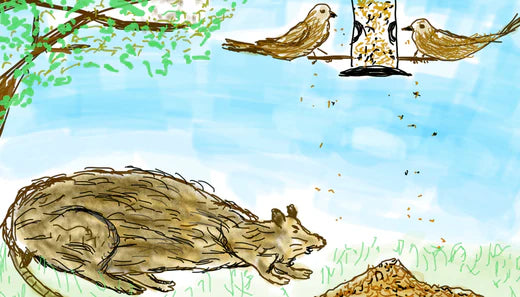

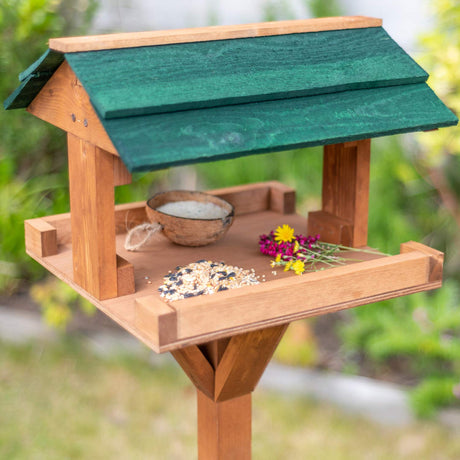
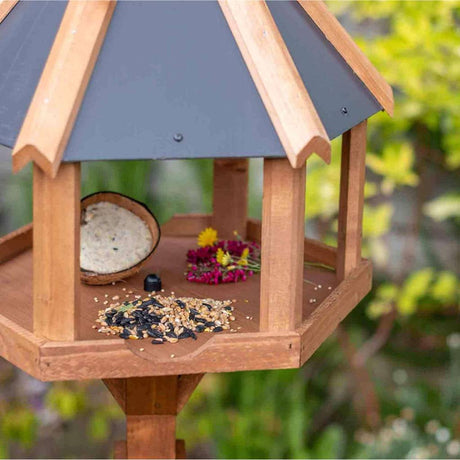
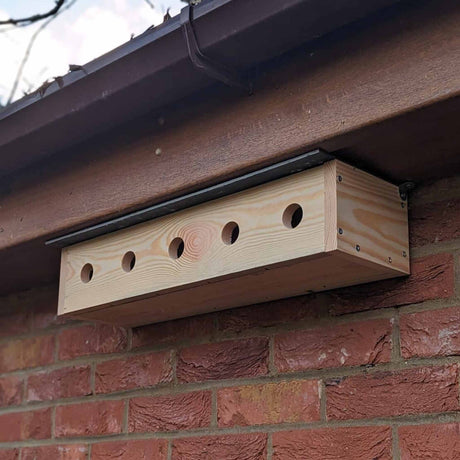
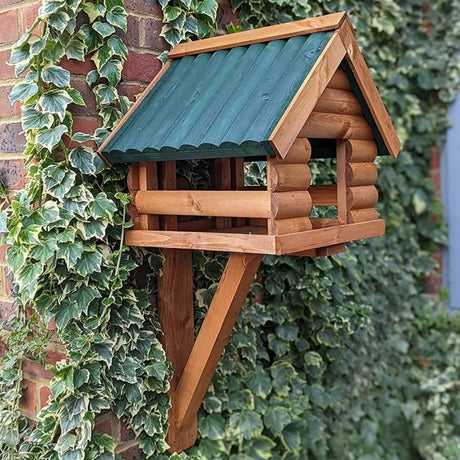
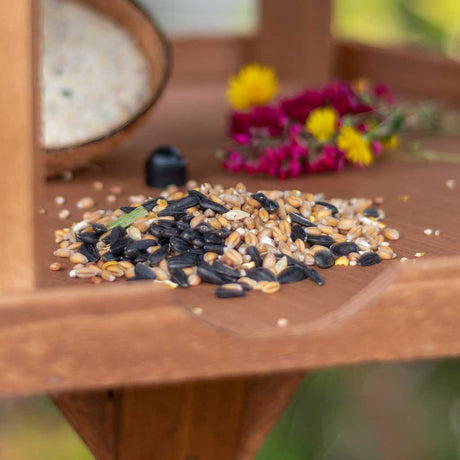
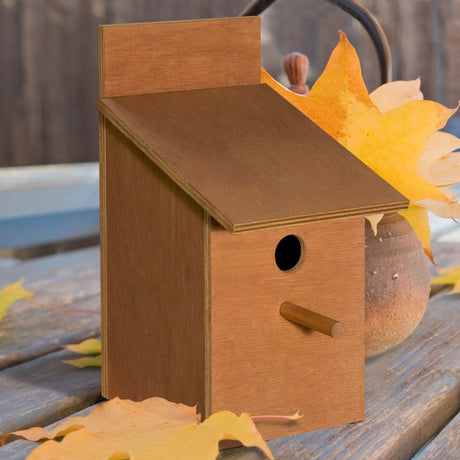

14 comments
A few years ago I bought a RSPB bird table which had a removable plastic insert in the base to take out and clean.I can’t find another one like that anywhere . It is impossible to properly clean a wooden base so why are they all made like that ?
I love feeding the birds but today sadly the feeding station was removed and binned. I went to hang out some washing and as I walked back a rat was just about to run through my kitchen door but saw me and scuttled off. I don’t dislike rats as long as they keep their distance but that was too close for comfort. My house backs on to fields so there’s plenty of wild life around including rats of course, I’ve tried the slippery pole bird feeder, I cone shape contraption to stop them climbing the pole, the seed catcher so nothing goes on the ground but my rats are very clever and great jumpers and climbers and seem to find food in my garden no matter how hard I try to keep it away from them so sadly I’ve had to give in. Poor birds ??
I have found using a plastic Sieve tied under the feeder is better than a lid as it lets the water out thereby keeping the food that is dropped in it fresher and not so soggy as it would be with a lid.?
I don’t know. The rats seem to have regular routines through their territories. They still come into our garden at night even though there isn’t anything at all for them that we know of. I know rats leave pee trails along well travelled pathways and they prefer to follow closely along walls and fences rather than travel into the open. They like to live near any potential food source such as rubbish bins compost heaps and bird feeders etc., etc., we live near farms and riding stables. Where cattle are feed cow cake and hay and live in open barns in winter. You’ll never get rid of rats. Sad fact is rats and humans have gone together for thousands of years. Natural rat and mice control of course are our little raptures. Like owls and hawks even foxes. But we humans have murdered most of them. So rats flourish all the more. We just have to accept rats are a nasty cheeky highly intelligent fact of life.
Well, I think yes. But you would still have to sweep up any spillages every day and remove the feeders before dusk at night. Don’t leave any fallen seeds at all or any feeders that rats can climb onto. We tried doing that, but the rats still moved in on the off chance of a free meal. They knew the feeders were there during the day. Rats are very cleaver beasties.
I and my mother have tried all ways to feed our birds without attracting rats. Sadly, the rats even took up residence in our house roof space when I fed the birds every day. Then they dug holes in my garden beside the feeders. I was horrified. We’ve been forced to accept we just can’t our birds. I even saw one rat stuffing a small apple into its cheek from our cooking apple tree. So even fruiting plants attract rats if you don’t collect the fruits in autumn. It’s a real problem.
My garden rat was spotted right close to a Starling eating spilt food from a pole feeder. This waa at 10.20 in the morning. Husband lived. No more bird feeding. Sad
Nest not meat
I have had a rat visit my garden a few nights ago so we removed the hedgehog feeding station and just sprinkled some kitten biscuits on the lawn for hh to forage. Hog must have another meat somewhere as they often do and hasn’t been around the last couple of nights but the rat came back last night and started going in his straw filled house. Today I have emptied and temp removed the house from garden. How long should I leave it till I can replace and refill.
Hi, we live near a farm and love feeding the birds, our problem is, because we live near the farm, we get rats out during the day, especially on our ground feeders, which we feed the robins, blackbirds and pheasants on, is there anything I can do to keep the rats off the ground feeders during the day, I obviously pick up everything at night, appreciate any advice kind regards
would sunflower hearts be safer to use and deter rats – no husks to feed on?
Hiya,I have bird feeders high up on my shed wall,they are taken in every night I also clean up with soapy water every night and have a cat who hunts but today I had to bring the feeders in as I saw a rat climb up my garden wall run across the lane door and drop down onto the food, how long will I have to stop feeding the birds before the rat moves on I refuse to use poison because of other wildlife but am devastated for the birds,please give some advice,no signs in the garden of holes etc
My entire soy electrical wiring system that keeps my car running is all chewed up due to rats. The lady next door ( very close to our garage) has pigeons and a several bird feeders. What a coincidence. Hmmm?
Hi Eric
I would use hanging feeders with a seed catcher tray underneath and take them in at night. And if you don’t feel even that is safe you could at least make sure there is always drinking water available.
Best of luck!